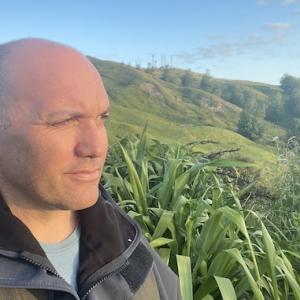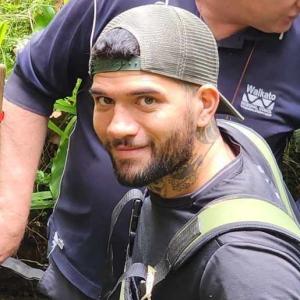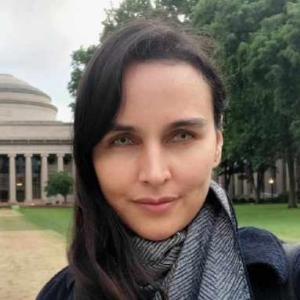With the recent news that Malaysian forestry giant Ernslaw has lost its Forest Stewardship Council certification due to the slash issues at Tairāwhiti, consequences seem to be finally reaching the perpetrators of unsustainable land practices, rather than just the people downstream from their operations.
Manu Caddie is a Tairāwhiti local and a critic of forestry companies like Ernslaw. However, while he says they have a lot to answer for, so too have the government and local councils that pushed pine forestry as a panacea to fix the well-known erosion-prone farming land, despite historical research suggesting pine was not the correct option.
As a result of the government encouraging people to invest in forestry, the region and its people are paying a devastating price today, says Manu. “Not only do we have the problem of slash, but we also now have whole forests collapsing because this type of soft geology and shallow soil was not suitable for tall-growing, shallow-rooting trees and now those trees will make their way into our rivers, pulling out what remains of the soil on their way to the ocean,” he says.
Manu says the Gisborne District Council is undertaking much-needed research on what land use options are sustainable on each parcel of land and he believes local people, as well as the government, need to listen to the science, unify behind a plan and make it work for the benefit of the economy, the environment, and the people of the Coast. “Whether the government does this is another question, because we are a small population who are easy to ignore because we don’t have the power to make a difference at election time,” he says.
Manu believes the government could be a lot more innovative when helping the region recover. While he wants to wait for the science to come out, he suspects much of the land will not be suitable for farming or forestry. He says native forests and other types of horticultural options will need to be major options to help the region recover environmentally and economically.
Manu has already started testing the waters with some options and has co-founded various businesses to explore solutions that are economical, sustainable and support employment in the region. He is the co-founder of Rua Bioscience, an NZX-listed biotech company specialising in medicinal cannabis. Rua has a cultivation site in Ruatoria and employs half a dozen people there.
Matawai Bio is another company that Manu co-founded that explores ingredients for functional foods and undertakes research for natural health products. Another company, Hikurangi Bioactives, has developed a Kānuka-based product for eczema. Manu says results from two clinical trials indicate that it is more effective than steroid-based creams and he is in talks with a US-based investor about global distribution options.
Manu believes there is a lot of potential for an industry based in Tairāwhiti, especially if the region must rethink its options for the land. To realise that potential, several key things must happen including: public and private investment into research and development for new industries; changes to the ETS to incentivise permanent Indigenous forest over monoculture pine plantations; better research on what is suitable land use; and an economic analysis of investment in other industries such as tourism, bio-actives and native timber products.
“We need to have options so we can have livelihoods that are connected to the land enabling whānau to stay on these erosion-prone lands. Otherwise, they will have to move away because there will be no work, and no homes because of infrastructure damage.”
“Other people are trying new ideas to grow the economy, but someone needs to do the economic analysis of different ventures to justify the investment,” he says.
A critical next step is getting the various interest groups including farming, forestry, iwi, and environmental to get a consensus on where to go and how to move the region forward from its predicament. Manu has a vision for the next 10 years for the region where he believes it could have an emerging Indigenous bio-economy based on using taonga for therapeutic products and cosmetics, as well as an economy with tourism, a variety of timber and other types of farming and horticulture.
“In 10 years my vision is that these things would be just getting going and we would have some good research completed for alternative uses. There would be lots of little companies emerging that are doing exciting things. Employment options could include the transition from forestry to planting, native nurseries, pest and plant control jobs enabling people to stay in the region,” he says.
If the people were unified and the government was supportive in terms of legislation, in 20 years he believes things could be looking up for the region.
“Those parts of the region that have been identified as being unsuitable for pine plantations and farming would have native trees on them which would be about 10 or 15 years old. The people working on that land would be close to their whenua, enjoying life and have a reasonable income and co-benefits from the ngahere. Whānau would be staying on the land because the flooding risk has been reduced. There could be a flourishing bio-economy.”
“It’s not too wild a dream – it’s the only option really. We need to do something with Indigenous species because we are going to have to drastically shrink the industries we have been relying on for over 100 years and build some new ones. The government needs to have a bigger vision for this region and not just fix broken roads.”
He Kōrero | Our Stories
Tairāwhiti local Manu Caddie is a vocal critic of forestry companies engaged in unsustainable land practices in the rohe. He shares his insights on what needs to change".
Last year a new species of fresh water golden clam was discovered in the Waikato awa. Its discovery spurred whānau, hapū and iwi to learn about the invasive species and to mobilise to stop its spread.
Neuroscientist Nicole Edwards is establishing her own lab at the University of Auckland and is eager to tautoko students interested in a career in brain research.


